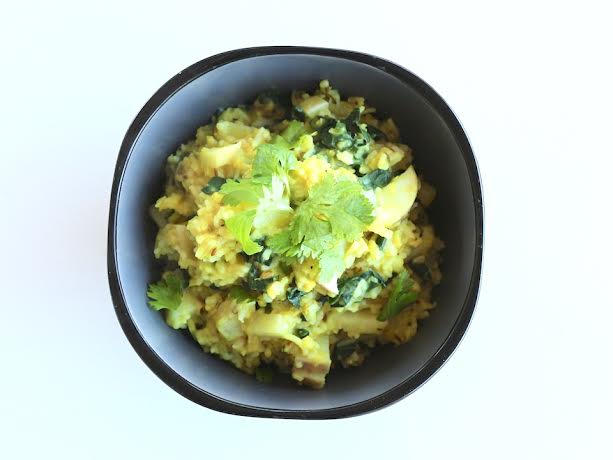I’m often on my own for lunch and dinner and tempted to settle for cheese and crackers or avocado and toast.
Let’s face it: cooking for one is not very motivating.
However, I know better than to call cheese and crackers a nourishing meal. Being on my own is no excuse to forgo a real meal. I’ve finally figured out how to make a single serving of wholesome deliciousness: kitchari.
The recipe requires very little hands-on time, cooks in about 25 minutes, and lends itself to a million variations.
Kitchari (also known as kichadi or kitcharee) is Ayurvedic food at its finest. This savory porridge is traditionally eaten during Ayurvedic cleanses because it’s nutrient rich and easy to digest.
Kitchari deserves to be in every recipe box. It’s the perfect yogi food, true soul food, and ridiculously easy to cook.
Kitchari for One
*Don’t be intimidated by the long list of ingredients. If you’re missing some of the spices just leave them out.
Ingredients:
- 1/4 cup white basmati rice
- 1/4 cup hulled and split mung beans (sold in Indian, Asian and health food markets)
- A scant 2 cups water
- 1 teaspoon ghee or coconut oil
- 1/2 inch fresh ginger, grated or finely chopped
- 1/4 teaspoon ajwain seeds
- 1/4 teaspoon cumin seeds
- 1/4 teaspoon fennel seeds
- 1/4 teaspoon ground cumin
- 1/4 teaspoon ground coriander
- 1/4 teaspoon turmeric
- 1 pinch of hing (asafoetida)
- A few tablespoons of chopped cilantro
- Himalayan salt (or sea salt) to taste
- Black pepper to taste
Directions:
Combine the rice and mung beans in a small saucepan and add some water. Stir a few times, then drain. Repeat once more.
Add the scant 2 cups of water. Bring to a boil, reduce the heat to low and cover.
Simmer for 20-25 minutes.
In a separate pan heat the ghee or coconut oil over medium heat. When it’s hot add the ginger, ajwain, fennel and cumin seeds. Stir for 30 seconds. Add the ground cumin, coriander, turmeric and hing. Stir for 10 seconds.
Pour the spices over the beans and rice. Add the cilantro and stir to mix. Add salt and pepper to taste.
Variation: Use a full 2 cups of water and stir in 1/2 cup of chopped vegetables during the last 10 minutes of cooking. Add a few extra tablespoons of water if needed. Or add 1/2 cup chopped swiss chard, spinach or kale during the last 4 minutes of cooking.
Kitchari can be made so many different ways by altering the rice, beans, spices or veggies. What’s your favorite variation? Share below!
Love elephant and want to go steady?
Sign up for our (curated) daily and weekly newsletters!
Author: Julie Bernier
Editor: Renée Picard
Photo: courtesy of the author


 Share on bsky
Share on bsky





Read 5 comments and reply